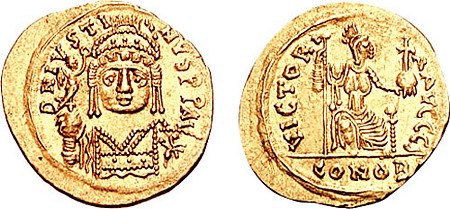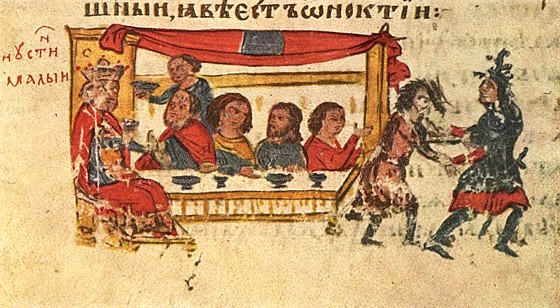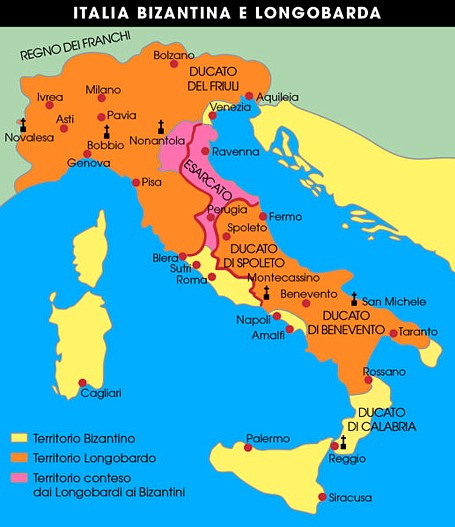Lessico
Giustino II

Solidus
di Giustino II
Moneta d'oro del peso di 4,55 g pari a 1/74 di libbra
posta da Costantino a base della sua riforma monetaria.
Giustino
II: imperatore bizantino (520
– 578), nipote di Giustiniano I, al
quale succedette nel 565 e si sforzò di continuarne la politica, ma di
riparare al tempo stesso alla crisi economica e finanziaria che ne era stata
inevitabile conseguenza. Durante il suo regno i Longobardi![]() iniziarono la conquista dell'Italia (568), i Persiani ripresero l'offensiva a
Oriente (572), gli Avari (popolazione nomade, probabilmente mongolica) attaccarono l'Impero da nord. Giustino fu colpito nel 574 da una
malattia mentale e da allora governarono per lui la moglie Sofia
iniziarono la conquista dell'Italia (568), i Persiani ripresero l'offensiva a
Oriente (572), gli Avari (popolazione nomade, probabilmente mongolica) attaccarono l'Impero da nord. Giustino fu colpito nel 574 da una
malattia mentale e da allora governarono per lui la moglie Sofia![]() e il generale Tiberio, che sostenne la guerra coi Persiani e, adottato come
figlio, gli succedette alla sua morte.
e il generale Tiberio, che sostenne la guerra coi Persiani e, adottato come
figlio, gli succedette alla sua morte.
Giustino II di Bisanzio

Punizioni
corporali fatte applicare da Giustino II
Miniatures from the Manasses Chronicle – XIV century
Ivan Duichev, Bulgarski hudojnik Publishing house, Sofia
Giustino II (520 – 578) è stato un imperatore bizantino dal 565 al 578. Fu nipote e successore di Giustiniano I (Tauresium, presso l'odierna Skopje, 482 - Costantinopoli 565). Giustino si avvalse della sua influenza come mastro di palazzo e del matrimonio con Sofia, nipote dell'imperatrice Teodora (Costantinopoli ca. 500-548), per assicurarsi un'elezione pacifica. I primissimi giorni del suo regno (quando pagò i debiti dello zio, amministrò la giustizia di persona e proclamò la tolleranza religiosa universale) diedero adito a speranze, ma di fronte all'aristocrazia senza legge e a governatori provinciali incuranti, furono poche le riforme che attuò successivamente.

L'evento più importante del suo regno fu l'invasione dell'Italia da parte dei Longobardi, che a partire dal 568, sotto Alboino, in pochi anni divennero padroni di metà della nazione, lasciando ai Bizantini quasi tutte le parti marittime, con i più grandi porti d'Italia, tra cui Venezia. L'attenzione di Giustino venne distolta dall'Italia verso i confini a nord e a est dell'impero. Dopo essersi rifiutato di pagare tributo agli Avari, combatté contro di essi diverse campagne infruttuose. Nel 572 le sue aperture ai Turchi portarono a una guerra con la Persia.
Dopo due campagne disastrose, nelle quali i Persiani travolsero la Siria, Giustino comprò una pace precaria dietro pagamento di un tributo annuo. Le temporanee crisi di follia nelle quali precipitava gli suggerirono di nominare un successore. Scavalcando i suoi parenti scelse come Cesare, su consiglio di Sofia, il generale Tiberio, nel dicembre 574. Giustino abbandonò la carica e si ritirò a vita privata per gli anni che gli restavano. Morì nel 578.
Flavius Iustinus (Iunior) Augustus (c. 520 - 578) was Eastern Roman emperor from 565 to 578. He was the nephew of Justinian I, and husband of Sophia, the niece of the late empress Theodora, and therefore member of the Justinian Dynasty. His reign is marked by war with Persia and the loss of the greater part of Italy.
When Justinian died on November 14, 565, Justin was elevated to the imperial throne. In the first few days of his reign he paid his uncle's debts, administered justice in person, and proclaimed universal religious toleration. Contrary to his uncle, Justin relied completely on the support of the aristocratic party.
In 568 the Lombards invaded Italy under Alboin, and in a few years they made themselves masters of nearly the entire country. Justin's attention, however, was distracted from Italy towards the North and East frontiers. Proud of character, he discontinued Justinian's policy of buying off potential enemies. After refusing to pay tribute to the Avars, Justin fought several unsuccessful campaigns against them, therefore he was forced to pay them 80,000 silver pieces. More importantly, in 572 his refusal to pay tribute to the Persians in combination with overtures to the Turks led to a war with the Sassanid Empire. After two disastrous campaigns, in which the Persians overran Syria and captured the strategically important fortress of Dara, Justin reportedly lost his mind. The temporary fits of insanity into which he fell warned him to name a colleague. Passing over his own relatives, he raised, on the advice of Sophia, the general Tiberius to be Caesar in December 574 and withdrew into retirement. In 574, Sophia paid 45,000 solidi to Chosroes in return for a year's truce. Sophia and Tiberius ruled together as joint regents for four years, while Justin sank into growing insanity. When he died in 578 Tiberius succeeded him as Tiberius II Constantine.
The historian Previte-Orton describes Justin as "a rigid man, dazzled by his predecessor's glories, to whom fell the task of guiding an exhausted, ill-defended Empire through a crisis of the first magnitude and a new movement of peoples". Previte-Orton continues: "In foreign affairs he took the attitude of the invincible, unbending Roman, and in the disasters which his lack of realism occasioned, his reason ultimately gave way. It was foreign powers which he underrated and hoped to bluff by a lofty inflexibility, for he was well aware of the desperate state of the finances and the army and of the need to reconcile the Monophysites."
The tardy knowledge of his own impotence determined him to lay down the weight of the diadem; he showed some symptoms of a discerning and even magnanimous spirit when he addressed his assembly: "You behold", said the emperor, "the ensigns of supreme power. You are about to receive them, not from my hand, but from the hand of God. Honor them, and from them you will derive honor. Respect the empress your mother: you are now her son; before, you were her servant. Delight not in blood; abstain from revenge; avoid those actions by which I have incurred the public hatred; and consult the experience, rather than the example, of your predecessor. As a man, I have sinned; as a sinner, even in this life, I have been severely punished: but these servants, (and we pointed to his ministers,) who have abused my confidence, and inflamed my passions, will appear with me before the tribunal of Christ. I have been dazzled by the splendor of the diadem: be thou wise and modest; remember what you have been, remember what you are. You see around us your slaves, and your children: with the authority, assume the tenderness, of a parent. Love your people like yourself; cultivate the affections, maintain the discipline, of the army; protect the fortunes of the rich, relieve the necessities of the poor."
In silence and in tears, the assembly applauded the counsels, and sympathized with the repentance of their prince. Tiberius received the diadem on his knees; and Justin, who in his abdication appeared most worthy to reign, addressed the new monarch in the following words: "If you consent, I live; if you command, I die: may the God of heaven and earth infuse into your heart whatever I have neglected or forgotten." The four last years of the emperor Justin were passed in tranquil obscurity: his conscience was no longer tormented by the remembrance of those duties which he was incapable of discharging; and his choice was justified by the filial reverence and gratitude of Tiberius.
According to John of Ephesus, as Justin II slipped into the unbridled madness of his final days he was pulled through the palace on a wheeled throne, biting attendants as he passed. He reportedly ordered organ music to be played constantly throughout the palace in an attempt to soothe his frenzied mind, and it was rumoured that his taste for attendants extended as far as devouring a number of them during his reign.